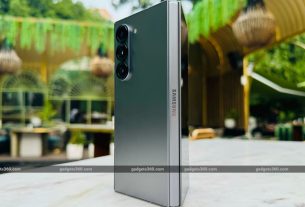Apple M2 Pro silicon, which will reportedly be built on Taiwan Semiconductor Manufacturing Company’s (TSMC) 3nm process, will go into mass production later this year, as per an analyst. The news follows the launch of the M2 chipset, which Apple unveiled at WWDC 2022 in its latest MacBook Air (2022) and the 13-inch MacBook Pro (2022) laptops. It is noteworthy that Mark Gurman has already claimed that the Cupertino-based company is testing a 14-inch MacBook Pro and a 16-inch MacBook Pro with M2 Pro chip.
Citing analyst Jeff Pu of Haitong Intl Tech Research, 9to5mac reports that Apple supplier TSMC will start mass producing the “more powerful M2 Pro chip” later this year. The chipset is said to be built on the 3nm process. If true, the silicon will be more powerful than the Apple Silicon M2 chip, which is built on the same 5nm process as M1.
Earlier this week, Apple unveiled its latest M2 chipset at WWDC 2022 in the MacBook Air (2022) and the 13-inch MacBook Pro (2022). The MacBook Air is the first refresh of the company’s MacBook Air laptop since the M1 powered MacBook Air made its debut in November 2020. Apple says that the M2 chipset has 20 billion transistors and a 10-core GPU. It is claimed to offer 18 percent improved CPU performance and 35 percent GPU performance over its predecessor, and is 1.9 times faster (CPU) and 2.3 times faster (GPU) compared to competing 10-core processors. The new chipset also comes with the new Secure Enclave, media engine and neural engine.
As mentioned, a previous report has claimed that Apple is already testing a 14-inch MacBook Pro and a 16-inch MacBook Pro with the M2 Pro chipset. Moreover, there is also a reference of “M2 Max” chip codenamed J414 that is said to have 12 CPU cores and 38 graphics cores, and support for 64GB of RAM. These two laptops are also being tested with the M2 Max chip, the report noted.
For the latest tech news and reviews, follow Gadgets 360 on Twitter, Facebook, and Google News. For the latest videos on gadgets and tech, subscribe to our YouTube channel.
